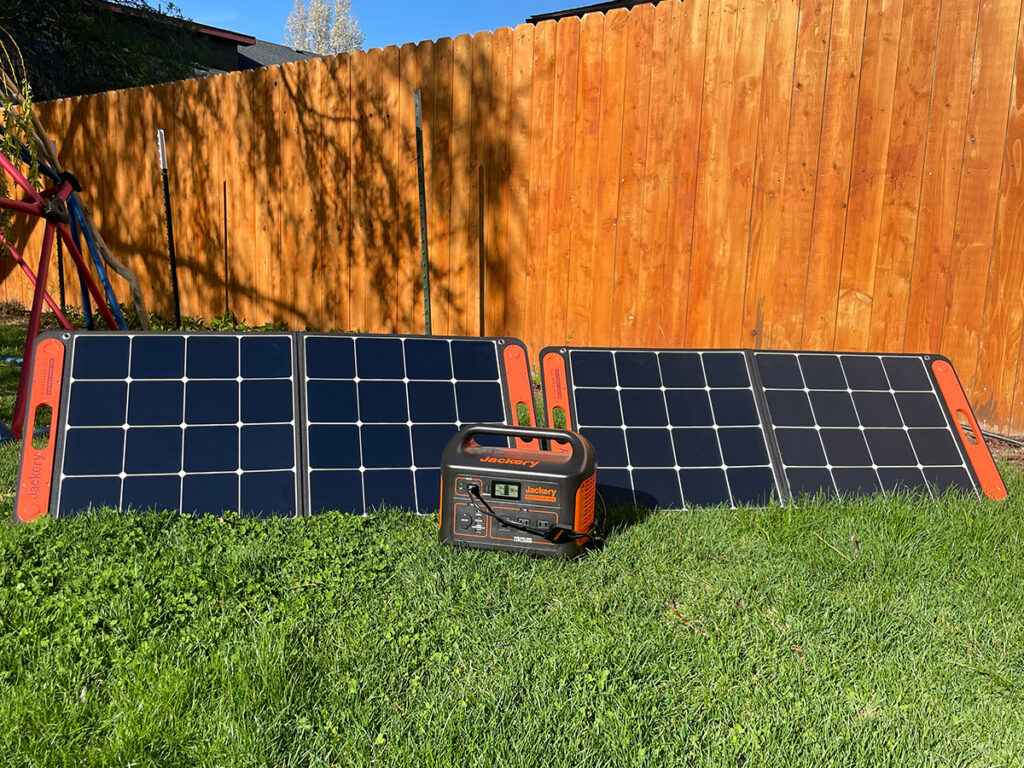
There are so many incredible benefits to using a solar generator, but they’re not the perfect solution for every case. That’s why it’s important to look at both the pros and cons of these generators so you can decide what kind of energy generator would be best suited to your situation, and determine if a solar generator is worth the cost.
For most, a solar generator is not worth the cost. While solar generators are light, compact, quiet, and offer free renewable energy they’re also expensive, store limited power, and generate power slowly. It’s also not recommended to charge at the same time you’re using it because this decreases long-term battery life.
While these are some of the reasons that a solar generator may or may not be best for your needs, it does not tell the whole story. Read on to learn accurate information about some of the pros and cons of owning a solar generator versus other generator options.
Pros of Using a Solar-Powered Generator
Solar Generators are Safe to Use Indoors
This is, for me at least, the biggest benefit of a solar generator. Because solar generators don’t burn any fuel you can have the power bank indoors to use it.
While most generators aren’t overly dangerous, solar-powered generators are consistently proven to be among the safest energy-generating systems that are available on the market.
I recently heard from someone who shared their story of using a gas generator during a power outage. Despite keeping it at least 15 feet from their house, the exhaust still managed to get inside through a window they cracked open to run a power chord through. In the middle of the night, their dog woke them up. They checked their CO levels and they were way too high. If not for their dog, they likely would have died in their sleep.
Solar Generators are Lightweight, Portable, & Compact
Solar-powered generators offer many benefits that are not available to those that use a gas-powered generator of some kind. One of these benefits is that solar-powered generators are both light in weight and easy to transport.
Meanwhile, gas-powered generators, tend to be large in size and relatively heavy. It is difficult to move these generators, and setting them up is difficult. They are especially troublesome when used in smaller spaces because of the amount of space they take up.
To solve this issue, newer models of solar-powered generators are designed to be both lightweight and portable. Solar generators have two parts: the power station and the solar panels themselves. The solar panels are what need to be exposed to sunlight, and the power source is connected to them.
Even when these two parts are connected, the product is smaller than most gas-powered generators. The smaller design of a solar-powered generator is also useful when it comes time to store the device.
Solar Generators are Practically Silent
Gas generators are really popular and have been the best option for a long time. Unfortunately, gas generators are usually very loud, making them less than ideal. Even inverter generators that are much quieter (and more expensive) make a lot of noise. Gas generators have an engine with lots of moving parts that make a lot of noise.
In contrast, solar-powered generators have no moving parts. They’re nearly silent, emitting at most a very faint buzz, which means they won’t distract you from whatever else you’re doing.
Customer reviews on various solar-powered generators are consistent in praising their quietness. I’ve used mine quite a bit and honestly, you can’t tell it’s on unless you get your ear right up to it.
Solar Power is a Free Renewable Energy Source
All solar-powered items and appliances use renewable energy, which is great for the environment. Other generators use fossil fuels like gasoline, propane, and natural gas, which may be more harmful to the environment. They’re also not free.
Solar Generators are User-Friendly
Gas generators can also have a lot of small engine troubles. I’ve cleaned the little carburetor on one of mine over a dozen times. That’s because we use them and then store them for a while before using them again, which gives any gas residue time to gum up the carburetor.
I now have one with a battery so it has an electric starter. That’s awesome! Except that since I don’t use it terribly often, the battery is usually dead when I need it so I end up using the pull-start anyway.
Solar Generators Can Hold their Charge for a Long Time
Additionally, these generators are able to remain charged for very extended periods of time, which is very convenient. I had one in my storage unit for about 3 months and it was still at 99% charge.
They can also provide quite a bit of power. I recently used one for an outdoor event to power a PA system. After 30 minutes or so of use, my 1000Wh Jackery was still at a 97% charge”. These generators will allow you to meet all of your energy-generating needs and do so with little time charging beforehand if you charge them up before putting them away.
Solar Generators are Perfect to Use in Parks and the Outdoors
A common time to use a power generator is when outdoors. Because solar-powered generators are small and lightweight, they’re also really portable, meaning that they can easily be transported from one location to the next without any trouble.
Since they’re easy to transport and super quiet, solar-powered generators are welcome in parks and other outdoor locations where you may be around other people.
Cons of Using a Solar-Powered Generator
Some Solar Generators are Highly Sensitive to Temperature
This is not a con for all types of solar generators, but it is applicable to many different models of solar generators. Some solar generators, specifically the power bank, are sensitive to extended periods of time in direct sunlight. Yes, I know it’s ironic, but it’s true.
You’ll need to keep an eye on how hot your solar generator is getting. When outside, it’s best to keep it out of direct sunlight so it doesn’t overheat.
There are some solar generators that have taken this issue into account. You’ll pay more for a solar generator with built-in cooling but it might be worth it.
Solar Power is an Inconsistent and Unreliable Energy Source
Alright, so it is true that solar-powered generators will have the power to obtain, store, and use as long as the sun is shining. While this is of great comfort, it is also important to recognize that this can be a downside as well. There are many locations in the world, times of day, seasons, weather patterns, and other uncontrollable natural factors which have a large impact on the ability of a solar-powered generator to function at all.
If you live in a location where there are limited sun hours or the weather is often cloudy or cold, it is likely that a solar-powered generator, or any solar-powered product, really, would be far less ideal. These are the situations in which the high price of a solar-powered generator, and other limiting qualities of the product, would outweigh the benefits of such a purchase.
Be aware of the location in which you live and the environmental factors that may make a solar-powered generator more or less favorable for your specific situation and needs. Someone who lives in California or Florida, for example, is likely aware that they receive a lot of sunlight year-round, which means that a solar-powered generator may be worth the higher price. For those that live in colder and cloudier areas, purchasing a fuel-powered generator is most likely going to be a better option, so that they don’t spend a large amount of money on a product that will only provide service during select times of the year when the sun is out more and rendered useless at other times.
Solar Generators are Pretty Expensive
It may seem like solar-powered generators would be a cost-effective option without any pitfalls, however, the “free” and completely renewable energy that these generators harvest from the sun seems to be included in the price of these generators.
They tend to be much more expensive than their gas-powered counterparts. In fact, this price difference is actually rather large. On average solar-powered generators cost roughly $2000, while a gas-powered generator with similar Wattage output costs half of this price or less.
Solar Generators Don’t Generate Power Very Quickly
Another downside to having a solar-powered generator rather than a gas-powered option is that they generate electricity relatively slowly.
A gas-powered generator only needs gas and it can be up and functioning immediately providing a steady current of electricity. A solar-powered generator, however, is completely dependent on the sun. And even in full sun they are unable to generate power very quickly and require an extended period of time in direct sunlight to charge.
A lot of solar generators, like my Jackery, can be recharged with an outlet or even a car. Even so, solar generators are less ideal for situations where you need a reasonably large amount of power for an extended period of time. In this way, fuel-powered generators are definitely better.
Are Solar Power Generators Worth it?
There are some situations where a solar generator is really ideal. For example, providing power inside your home during a power outage or when camping or enjoying an outdoor activity where loud noise would be a nuisance.
On the other hand, I’d recommend that most people who want to be prepared keep a dual or even tri-fuel generator around with more Wattage that you can run a lot more stuff with.
I do love how lightweight, portable, compact, and quiet my Jackery is and that it’s completely safe to use indoors. But unless you have the extra money to spend or a fairly regular use for a solar generator, it’s probably not worth the cost. At least not if you don’t already have a solid fuel-powered generator.
